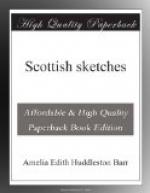“Christine thou speaks hard words.”
“Was it to speak easy anes thou brought me here? An’ if I said, ’I counsel thee to tak thy ain will i’ the matter,’ wad my counsel mak bad gude, or wrang right? Paul Calder’s fleet sails i’ twa days; seek a place i’ his boats.”
“Then I shall see next to naught o’ Margaret, an’ Ragon will see her every day.”
“If Margaret loves thee, that can do thee nae harm.”
“But her father favors Ragon, an’ of me he thinks nae mair than o’ the nets, or aught else that finds his boats for sea.”
“Well an’ good; but no talking can alter facts. Thou must now choose atween thy mother an’ Margaret Fae, atween right an’ wrang. God doesna leave that choice i’ the dark; thy way may be narrow an’ unpleasant, but it is clear enough. Dost thou fear to walk i’ it?”
“There hae been words mair than plenty, Christine. Let us go hame.”
Silently the little boat drifted across the smooth bay, and silently the brother and sister stood a moment looking up the empty, flagged street of the sleeping town. The strange light, which was neither gloaming nor dawning, but a mixture of both, the waving boreal banners, the queer houses, gray with the storms of centuries, the brown undulating heaths, and the phosphorescent sea, made a strangely solemn picture which sank deep into their hearts. After a pause, Christine went into the house, but John sat down on the stone bench to think over the alternatives before him.
Now the power of training up a child in the way it should go asserted itself. It became at once a fortification against self-will. John never had positively disobeyed his mother’s explicit commands; he found it impossible to do so. He must offer his services to Paul Calder in the morning, and try to trust Margaret Fae’s love for him.
He had determined now to do right, but he did not do it very pleasantly—it is a rare soul that grows sweeter in disappointments. Both mother and sister knew from John’s stern, silent ways that he had chosen the path of duty, and they expected that he would make it a valley of Baca. This Dame Alison accepted as in some sort her desert. “I ought to hae forbid the lad three years syne,” she said regretfully; “aft ill an’ sorrow come o’ sich sinfu’ putting aff. There’s nae half-way house atween right an’ wrang.”
Certainly the determination involved some unpleasant explanations to John. He must first see old Peter Fae and withdraw himself from his service. He found him busy in loading a small vessel with smoked geese and kippered fish, and he was apparently in a very great passion. Before John could mention his own matters, Peter burst into a torrent of invectives against another of his sailors, who, he said, had given some information to the Excise which had cost him a whole cargo of Dutch specialties. The culprit was leaning against a hogshead, and was listening to Peter’s intemperate words with a very evil smile.




